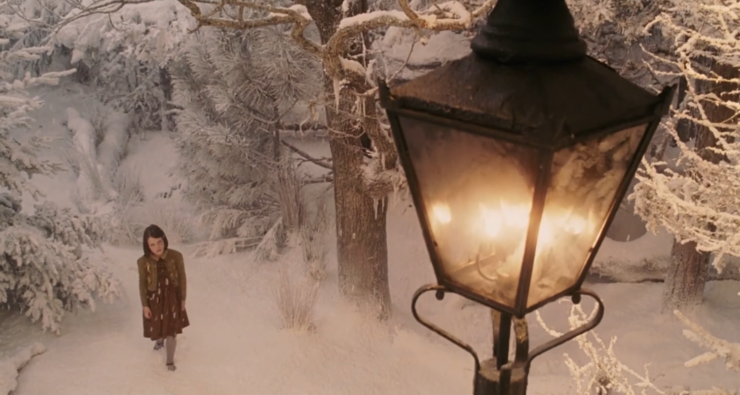C.S. Lewis hadn’t intended to write a sequel to The Lion, the Witch and the Wardrobe—but a friend wanted to know why that mysterious lamp-post had been sitting in the forest. So Lewis wrote a prequel, starring a younger version of Professor Kirke…
Or he began to.
The Magician’s Nephew was the hardest book to write in the Narnia series. It took C.S. Lewis five years, one significant redraft, and completing every other book in the Narnia series before he’d finally beaten The Magician’s Nephew into an acceptable shape.
Which is funny—because if even C.S. Lewis struggles with writing a prequel, why do so many screenwriters and novelists think they can toss off a prequel that’s genuinely satisfying? The pop culture landscape is rife with prequels that either bombed entirely or quietly faded from fandom memory—Solo, Hannibal Rising, Prometheus, Monsters University, and for our purposes, we’re all just going to forget that Young Sheldon is technically a ratings smash.
Why are prequels so hard to pull off?
It’s to Lewis’ credit that he dodged all the bad ideas that have suffused the multitudes of other, lesser prequels since then. And I think it’s worth studying why The Magician’s Nephew stands toe-to-toe with the other books in the Narnia canon—and I’d argue that the first reason is that Magician’s Nephew didn’t have much continuity that it needed to be shackled to.
The characters in the Narnia books have always been broadly drawn—Lucy is sweet and honest, Susan is girlish and stuck-up, and Eustace Clarence Scrubb nearly deserves that name. But even by those standards, Professor Digory Kirke is more of a sketch than a person in The Lion, the Witch and the Wardrobe; he has no personality aside from “mysterious” and “kind,” serving as a plot device to: (a) get the kids out to this weird estate, and (b) to back Lucy up when her siblings literally have no other reason to believe in mystical explanations.
So thankfully, because of both the Professor’s age and his comparatively blank slate, Lewis is free to model Digory after his own history—making Digory a sympathetic kid with a sick mom, prone to both arrogance and jerkishness. Then again, Narnia runs on kids being jerks to each other, so that works in Nephew’s favor.
It would have been easy for Lewis to fall into the classic prequel mistake of assuming that the person we saw in the original book was always that way, importing their old habits wholesale—leaving Digory a sixty-year-old bookish recluse in a schoolboy outfit, mysteriously grumping his way through his origin story.
I mean, I enjoy Muppet Babies as much as anyone else, but isn’t it kinda depressing to think that someone’s core personality traits are set in stone in kindergarten? And that the friends you had in grade school are now your immutable social circle, a cheerful prison of the same characters you’ll be working with until you die?
Yet this is something the more successful modern prequels get correct—if Better Call Saul had been a sitcom about Breaking Bad’s endearingly shady shyster lawyer mentoring his first group of crooks, it’d have probably been canceled after its second season. But what makes Better Call Saul vibrant is that Saul is not the character we know from the prior story—he’s Slippin’ Jimmy, a man with a good heart, a desperate desire to do right, and a need to impress his overly-strict and massively more successful brother.
By allowing the character to be not the person we already know, there’s room for both change and surprise.
More importantly: It’s difficult to discover anything new about someone who’s presented in the exact same way they were the first time we met them. Lewis isn’t asking, “Remember what you knew about the Professor in the last book?” and then sticking to some hoary blueprint; rather he asks, “Remember what you liked about the kids in this series?”
Buy the Book


The Chosen and the Beautiful
Which is the question that actually permeates the book—Lewis consistently prioritizes “Remember what you enjoyed?” over “Remember what happened?” Because yes, Jadis the White Witch shows up in the book, and hoo boy does she make an appearance—but it’s notable that we get an explanation for where she came from, but not an origin story.
What made Jadis so awful? That’s of no interest to Lewis; she’s always been wretched. Where did she acquire her powerful magics? She’s, you know, royal, where she lives magic comes with the territory. Why does she—
Hey, Lewis asks, Do you wanna watch Jadis racing a horse-drawn cab through 1900s-era London, demanding the people kneel before her as she tears lamp-posts apart with her bare hands?
Heck yeah I do!!! shouts the audience, and lo the middle third of the book is largely the joy of watching Jadis wreak mayhem in our world.
The question Lewis is actually answering is, “What did people enjoy about the previous book, and how can I give them more of that?” Whereas when you look at far drearier prequels, the question they’re starting with all too often is: “What don’t we know?”
“What we don’t know?” is often the boringest possible question you could ask.
Look at Solo—a movie that seems like it was written according to a checklist designed by barroom trivia writers desperate to drum up business. What the viewers wanted was for the film to answer questions like, “Why did we fall in love with Han Solo, and can we see him doing those flamboyant things again?”
Instead, Solo wants to answer questions like, “Where did Han Solo get his blaster?”
I mean, I dunno, I always assumed he just bought a gun at the Mos Eisley equivalent of Cabela’s, and it shoots well enough that he’s kept it.
No, says the movie. Han loves that gun. He loves it so much. He will never not use that gun. And do you know why?
I didn’t really care, no—
He loves that gun because his buddy gave it to him.
Okay, was the blaster given to him during the sort of interesting firefight that only Han Solo gets into?
No, the dude just hands it to Han over a campfire.
Huh. Can we go back to Jadis screaming “F**K THE POLICE” as she brains London bobbies with a lamp-post?
And again, The Magician’s Nephew could have easily had a scene where Digory is hiding from Jadis and there’s a man next to him smoking and Digory goes oh, the smell of tobacco, it’s so comforting, perhaps someday I shall smoke a pipe—but that doesn’t really seem like the fun of Narnia so much as a crazy 1950s advertisement for tobacco where the toasted leaves of Pipeweed™ blend make for stronger lungs.
Instead, what we get is the origin of Narnia—which is delightful in peculiarly Narnian ways, because we have newfound animals loping around being adorable as they eagerly explore this world their neo-Christian Lion-God has given to them.
It’s hard to say why, exactly, Lewis found The Magician’s Nephew so hard to write; we know there were structural issues, as pointed out by a friend of his, and there’s a (potentially false) early manuscript called The Lefay Fragment that has almost nothing in common with The Magician’s Nephew as we know it. And even if the Lefay Fragment is real, Lewis ordered his drafts destroyed, so we don’t have a good window into his thought process.
But what I think at least part of Lewis’ problem in writing “Polly and Digory” (the book’s original name) was that the genesis of the story involved answering the wrong question.
Do we need to know about the lamp-post?
For most of us, that answer is “no.” Most readers bring a delightful, childish wonder to a story, cheerfully trusting there’ll be weird spots we just roll with. Why do dragons breathe fire? How do repulsor beams work? Why is Tom Bombadil’s poetry so powerfully insufferable?
We accept “That’s just how it is” and move on.
Which is not to say that you can’t explain a mysterious part of the story. Authors have opened up wonderful new aspects of lore by diving into unanswered questions. Heck, the best fanfiction mines these blank spots to create wonders.
Yet the answers to those questions have to reverberate in some interesting way that adds depth or emotional resonance to what we already know! Because the failure state of answering questions we’d taken for granted is seizing some innocent wonder by the collar and explaining all the magic out of it.
Like all good barroom trivia, the answer must be more interesting than the question.
I think Lewis needed all that time to write The Magician’s Nephew in part because he was wise enough to realize that prequels hold their own special danger—you have to answer some questions about What Has Gone Before, yes, but which of those questions should drive the plot beats of the story, and which should be left a mystery?
In that final manuscript, thankfully, the lamp-post is an afterthought—literally a toss-off, as Jadis hurls the post at Aslan in an attempt to murder him, and it falls to the ground to grow like all other things in proto-Narnia. But the star of the show remains Jadis, our glorious hate-fueled YAS KWEEN, and the story would be no less entertaining if she tried to brain Aslan with a branch or a piece of hansom cab or even useless old Uncle Andrew.
We don’t need to know about the lamp-post.
You can tell us, sure.
But you’d better make sure you’re answering the right questions.
“Make your choice, adventurous Stranger;
Strike the bell and bide the danger,
Or wonder, till it drives you mad,
What would have followed if you had.”― C.S. Lewis, The Magician’s Nephew
Ferrett Steinmetz is the author of the novels The Sol Majestic and Automatic Reload from Tor Books, as well as the ‘Mancer trilogy and The Uploaded. He is a graduate of both the Clarion Writers’ Workshop and Viable Paradise, and was nominated for the Nebula Award in 2012, for his novelette Sauerkraut Station. Ferrett can be found on Twitter as @ferretthimself, and his new podcast, …And We Will Plunder Their Prose, analyzes the writing techniques of great modern speculative fiction.










